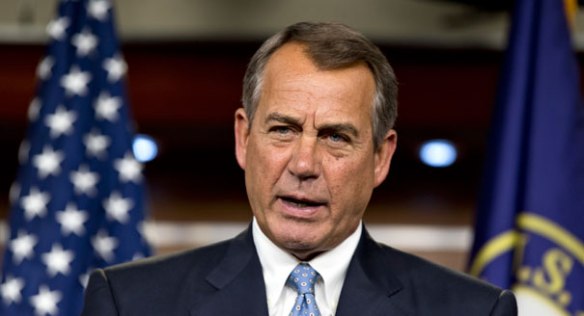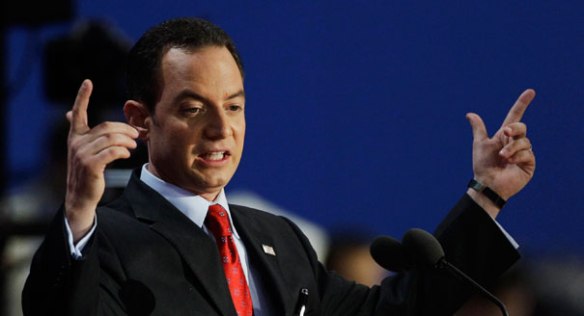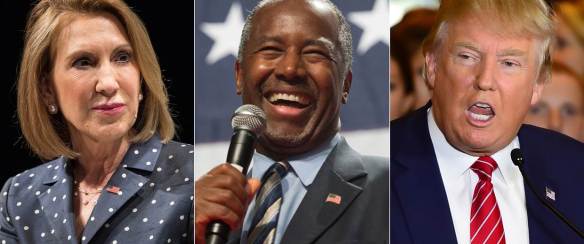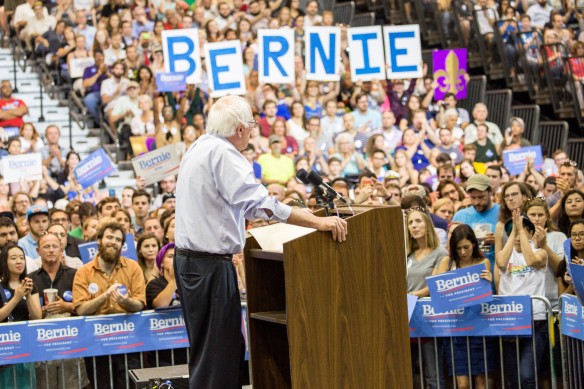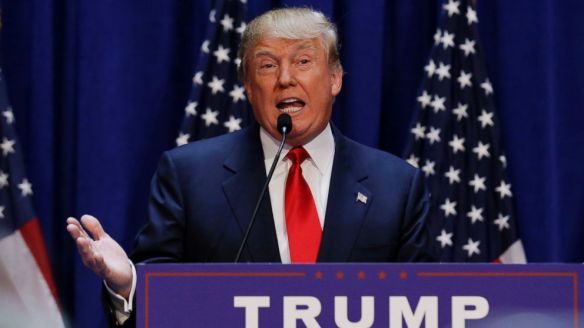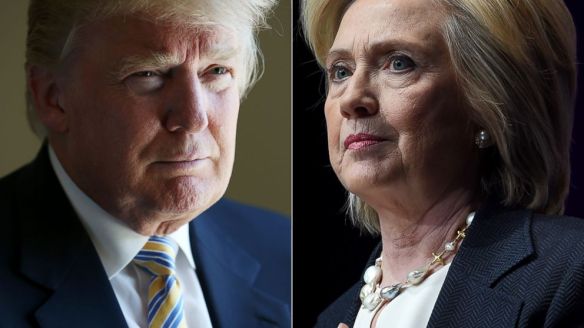
Donald Trump and Hillary Clinton took home huge victories on Super Tuesday, cementing their positions as frontrunners of their respective primaries.
Super Tuesday is always considered a crucial day in both the Republican and Democratic primary calendars. This campaign cycle, however, the twelve states that held their nominating contests on March 1st broke decisively for two candidates and may have effectively set each party’s frontrunner on inevitable paths toward their respective nominations.
Though twelve states cast their votes, there were only eleven for each party; Alabama, Arkansas, Georgia, Massachusetts, Minnesota, Oklahoma, Tennessee, Texas, Vermont and Virginia made their choices in both parties, while Colorado held their contest for Democrats and Alaska held theirs for Republicans. The day’s south-heavy lineup led to it being dubbed the March 1st “SEC primary”, a day that will now live in infamy for the candidates in both parties.
On the Republican side, Ted Cruz had been hailing March 1st as the most important day of his campaign from the earliest stages of the race. The Texas Senator was confident that he’d be able to win his home state and use his strong evangelical, constitutional and military appeal in the other states across the south. Widely considered the champion of principled conservatism, Cruz was expected to steamroll his way through the numerous states that resembled his home state of Texas in their electorate and key issues.
What he never saw coming was Donald Trump. Though the real-estate mogul has struggled at times to present his self-declared spirituality to the voters, including a now infamous moment in a speech at Liberty University where he referred to the Bible verse Second Corinthians as “Two Corinthians”, Trump has run rampant with the evangelical voters that Cruz once considered his base. In previous cycles, the thought of a wealthy, New York businessman sweeping the south would have been laughed off by any prudent political operative, but that is exactly what Super Tuesday has delivered.
Among the seven southern states that cast their votes in the Republican primary on Tuesday, Trump triumphed in five of them; Alabama, Tennessee, Georgia, Virginia and Arkansas. He won commandingly in the first three states but had to work a little harder to eke out wins over Rubio and Cruz in Virginia and Arkansas respectively. However, the billionaire businessman was just able to defeat Virginia’s strong Republican establishment population and Cruz’s near-home state advantage in Arkansas to ensure his dominance in the south. He also took Massachusetts and Vermont in big wins to continue his series of New England victories. He also managed to steal the headlines through a series of high-profile endorsements including Alabama Sen. Jeff Sessions, Maine Gov. Paul LePage, and, most importantly, ex-presidential candidate and New Jersey Gov. Chris Christie.
Though Ted Cruz’s southern firewall was effectively dismantled, he managed to scrap his way to three important wins. He thumped Trump in his home state of delegate-rich Texas and battled to more tightly contested wins in neighboring Oklahoma and distant Alaska. The triumphs gave Sen. Cruz a chance to continue to push the narrative that he is the only viable alternative to Donald Trump.
Marco Rubio had a very difficult night. The Florida senator failed to win in establishment-haven Virginia and only managed a single victory in the Minnesota caucuses, his first victory at all so far this primary season. Though the GOP establishment has firmly settled itself behind Marco Rubio as their preferred choice, his consistent , at the polls has continued to plague the senator’s campaign. Rubio came after Trump very aggressively in the weeks preceding Super Tuesday in a series of attacks, all to little avail in the end.
John Kasich and Ben Carson, truth be told, played solely the role of spoilers. Though Kasich was within three percentage points of Trump in Vermont, his 9% of more moderate voters in Virginia could have been enough to propel Rubio past Trump in the state. Carson helped Trump in Arkansas, where his 5% of mostly evangelical voters could have put Ted Cruz over the top into a victory. As a result of finishing fifth in almost every state, Carson suspended his campaign on Friday, though Kasich persists in his efforts to win the nomination.
Trump now has 329 delegates of the 1,237 needed to win the nomination, opening up a sizable gap between himself and Ted Cruz (231) and Marco Rubio (110). Some Republicans, including Mitt Romney in a speech to the University of Utah on Friday, have said that a brokered convention could be the only way to stop Trump’s rise in a manner that hasn’t been seen in decades.
The Democratic race was just as disparate on Super Tuesday. Hillary Clinton was always the favorite in the south due to her dominance among African-American voters that make up a large part of the electorate. However, Sen. Bernie Sanders hoped to channel his populist, barnstorming campaign into energetic victories in five states that he targeted most closely; Massachusetts, Colorado, Minnesota, Oklahoma, and his home state of Vermont.
The democratic-socialist managed to pull out victories in four of those states; he fell short in Massachusetts by just one percent. However, he just pipped Clinton in Colorado, Minnesota, and Oklahoma and delivered a thoroughly commanding win in Vermont.
As a whole, though, Super Tuesday was clearly Hillary Clinton’s night. Alabama, Bill Clinton’s, Arkansas, Georgia, Massachusetts, Tennessee, delegate-heavy Texas and Virginia all supplanted her strong delegate lead. Though some states were close, the Clinton machine managed to generate wins by as much as sixty percent, blowing her progressive opponent out of the water through her huge black and Hispanic following.
The ex-Secretary of State’s delegate lead over Sen. Sanders puts Trump’s lead to shame. Though she leads by fewer than two hundred delegates through voting, her commanding advantage among superdelegates, Democratic Party insiders and lawmakers that cast their votes at the convention and who are not bound by their state’s results, her total count lies at 1,058 out of the 2,383 needed to win. Sanders sits at just 431 and would need to start to run the table in the coming contests if he is to have a chance at overwhelming Clinton’s massive superdelegate count.
As both frontrunners now look to hold onto their leads, the coming states could make or break their opposition. Perhaps most important of all is the state of Florida, a winner-take-all competition with a high delegate count in the Republican primary. Amid calls from some for Marco Rubio to drop out of the race, he will have to win his home state to keep credibility. However, he trails the bombastic Trump by twenty points in the the latest polls, and Florida could be the nail in Rubio’s coffin.
On the Democratic side, this upcoming Saturday could be Sen. Sanders’ chance to bounce back. Though Clinton will likely win big in Louisiana, Sanders’ campaign manager Jeff Weaver has expressed confidence in his candidate’s ability to win in the other three “sweet spot” states for Sanders; Kansas, Nebraska and Maine, all caucus states with mostly white populations. Should he win those states, triumph in embattled Michigan, and go into March 15th swinging, this primary campaign might not be over. However, Clinton will look for a big delegate boost that day in Florida, Illinois, North Carolina and Ohio, so all things still carefully rest in the balance. Sanders is also now out-raising the Clinton campaign through his online, small donor-based funding and has promised to stay in the race until the convention.
Regardless of what happens in either party as the calendar moves forward, Super Tuesday has seriously tilted both the Republican and Democratic primaries toward the frontrunners, Donald Trump and Hillary Clinton. Their seemingly insurmountable delegate leads continue to grow, but plenty of states are left in each primary and anything could yet happen.

